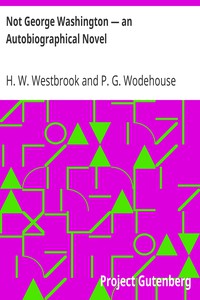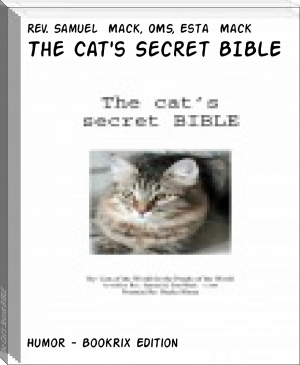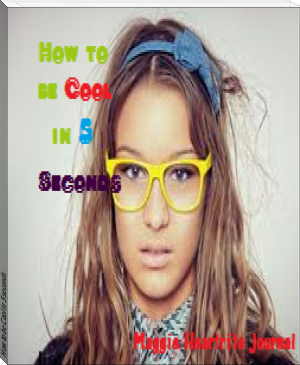Not George Washington — an Autobiographical Novel, Westbrook and Wodehouse [readera ebook reader .TXT] 📗

- Author: Westbrook and Wodehouse
Book online «Not George Washington — an Autobiographical Novel, Westbrook and Wodehouse [readera ebook reader .TXT] 📗». Author Westbrook and Wodehouse
I reflected.
"Well, of course, I do a certain amount of odd work, but lately I've rather narrowed it down, and concentrated my output. It seemed to me a better plan than sowing stuff indiscriminately through all the papers in London."
"Well, how many stunts have you got? There's your serious verse—one. And your Society stuff—two. Any more?"
"Novels and short stories."
"Class them together—three. Any more?
"No; that's all."
"Very well, then. What you must do is to look about you, and pick carefully three men on whom you can rely. Divide your signed stuff between these three men. They will receive your copy, sign it with their own names, and see that it gets to wherever you want to send it. As far as the editorial world is concerned, and as far as the public is concerned, they will become actually the authors of the manuscripts which you have prepared for them to sign. They will forward you the cheques when they arrive, and keep accounts to which you will have access. I suppose you will have to pay them a commission on a scale to be fixed by mutual arrangement. As regards your unsigned work, there is nothing to prevent your doing that yourself—'On Your Way,' I mean, whenever there's any holiday work going: general articles, and light verse. I say, though, half a moment."
"Why, what?"
"I've thought of a difficulty. The editors who have been taking your stuff hitherto may have a respect for the name of James Orlebar Cloyster which they may not extend to the name of John Smith or George Chandos, or whoever it is. I mean, it's quite likely the withdrawal of the name will lead to the rejection of the manuscript."
"Oh no; that's all right," I said. "It's the stuff they want, not the name. I don't say that names don't matter. They do. But only if they're big names. Kipling might get a story rejected if he sent it in under a false name, which they'd have taken otherwise just because he was Kipling. What they want from me is the goods. I can shove any label on them I like. The editor will read my ghosts' stuff, see it's what he wants, and put it in. He may say, 'It's rather like Cloyster's style,' but he'll certainly add, 'Anyhow, it's what I want.' You can scratch that difficulty, Julian. Any more?"
"I think not. Of course, there's the objection that you'll lose any celebrity you might have got. No one'll say, 'Oh, Mr. Cloyster, I enjoyed your last book so much!'"
"And no one'll say, 'Oh, do you write, Mr. Cloyster? How interesting! What have you written? You must send me a copy.'"
"That's true. In any case, it's celebrity against the respite, obscurity against Miss Goodwin. While the system is in operation you will be free but inglorious. You choose freedom? All right, then. Pass the matches."
CHAPTER 12 — THE FIRST GHOST
(James Orlebar Cloyster's narrative continued)
Such was the suggestion Julian made; and I praised its ingenuity, little thinking how bitterly I should come to curse it in the future.
I was immediately all anxiety to set the scheme working.
"Will you be one of my three middlemen, Julian?" I asked.
He shook his head.
"Thanks!" he said; "it's very good of you, but I daren't encroach further on my hours of leisure. Skeffington's Sloe Gin has already become an incubus."
I could not move him from this decision.
It is not everybody who, in a moment of emergency, can put his hand on three men of his acquaintance capable of carrying through a more or less delicate business for him. Certainly I found a difficulty in making my selection. I ran over the list of my friends in my mind. Then I was compelled to take pencil and paper, and settle down seriously to what I now saw would be a task of some difficulty. After half an hour I read through my list, and could not help smiling. I had indeed a mixed lot of acquaintances. First came Julian and Malim, the two pillars of my world. I scratched them out. Julian had been asked and had refused; and, as for Malim, I shrank from exposing my absurd compositions to his critical eye. A man who could deal so trenchantly over a pipe and a whisky-and-soda with Established Reputations would hardly take kindly to seeing my work in print under his name. I wished it had been possible to secure him, but I did not disguise it from myself that it was not.
The rest of the list was made up of members of the Barrel Club (impossible because of their inherent tendency to break out into personal paragraphs); writers like Fermin and Gresham, above me on the literary ladder, and consequently unapproachable in a matter of this kind; certain college friends, who had vanished into space, as men do on coming down from the 'Varsity, leaving no address; John Hatton, Sidney Price, and Tom Blake.
There were only three men in that list to whom I felt I could take my suggestion. Hatton was one, Price was another, and Blake was the third. Hatton should have my fiction, Price my Society stuff, Blake my serious verse.
That evening I went off to the Temple to sound Hatton on the subject of signing my third book. The wretched sale of my first two had acted as something of a check to my enthusiasm for novel-writing. I had paused to take stock of my position. My first two novels had, I found on re-reading them, too much of the 'Varsity tone in them to be popular. That is the mistake a man falls into through being at Cambridge or Oxford. He fancies unconsciously that the world is peopled with undergraduates. He forgets that what appeals to an undergraduate public may be Greek to the outside reader and, unfortunately, not compulsory Greek. The reviewers had dealt kindly with my two books ("this pleasant little squib," "full of quiet humour," "should amuse all who remember their undergraduate days"); but the great heart of the public had remained untouched, as had the great purse of the public. I had determined to adopt a different style. And now my third book was ready. It was called, When It Was Lurid, with the sub-title, A Tale of God and Allah. There was a piquant admixture of love, religion, and Eastern scenery which seemed to point to a record number of editions.
I took the type-script of this book with me to the Temple.
Hatton was in. I flung When It Was Lurid on the table, and sat down.
"What's this?" inquired Hatton, fingering the brown-paper parcel. "If it's the corpse of a murdered editor, I think it's only fair to let you know that I have a prejudice against having my rooms used as a cemetery. Go and throw him into the river."
"It's anything but a corpse. It's the most lively bit of writing ever





Comments (0)